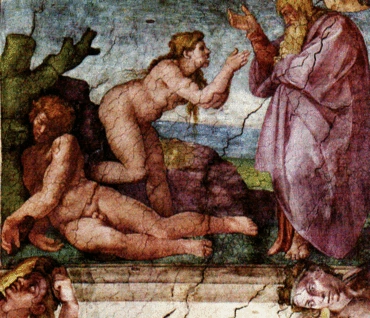Explanation of Genesis 2:24
作者: Brian David

This verse uses "man" in a masculine sense, meaning thoughts and ideas in the intellect. Leaving father and mother means leaving the former state of internal spiritual awareness, and cleaving to his wife means being conjoined instead with the external awareness of life. Being one flesh means that the internal of the man and the external of the wife were together as one in life.
The people of the Most Ancient Church wanted to live from themselves. So the Lord created in them the capacity to feel that, though it meant they had to descend from the spiritual awareness they had enjoyed. But they weren't bad people; they still loved the Lord and wished to be good. They just wanted to feel that they were doing it themselves. By having the man cleave to the wife, the Lord allowed the people's higher internal states to enter into their external lives and be part of that sense of self, so they could indeed love the Lord as if from themselves.
(参照: Arcana Coelestia 160, 161, 162)
Name
According to Swedenborg, a person's name in the Bible represents his or her entire spiritual nature, their whole state of love (good or evil) and thought (from heavenly wisdom to infernal insanity). This is why the name of the Lord is so important; it represents and embodies His perfect love and perfect wisdom, which is everything that we should worship and follow. It's easy to see that names are important in the Bible. Jehovah changed Abram and Sarai to Abraham and Sarah, changed Jacob to Israel and included in the Ten Commandments the order that believers "shall not take the name of the Lord your God in vain." In the New Testament, Zacharias was told to name John the Baptist "John," and both Joseph (Matthew 1:21) and Mary (Luke 1:31) were told to name Jesus "Jesus." Jesus himself renamed Simon as Peter, and included the phrase "hallowed be thy name" in the Lord's prayer.
(参照: Luke 1)






